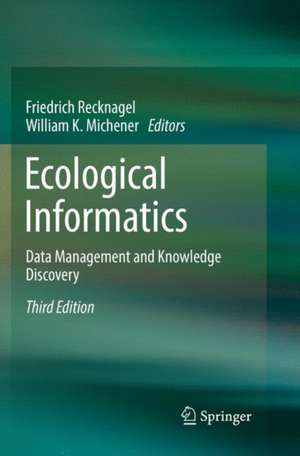Ecological Informatics: Data Management and Knowledge Discovery
Editat de Friedrich Recknagel, William K. Micheneren Limba Engleză Paperback – 14 aug 2018
In comparison to the 2nd edition published in 2006, the 3rd edition of Ecological Informatics has been completely restructured on the basis of the generic conceptual f
ramework provided in Figure 1. It reflects the significant advances in data management, analysis and synthesis that have been made over the past 10 years, including new remote and in situ sensing techniques, the emergence of ecological and environmental observatories, novel evolutionary computations for knowledge discovery and forecasting, and new approaches to communicating results and informing decisions.
| Toate formatele și edițiile | Preț | Express |
|---|---|---|
| Paperback (1) | 1051.86 lei 39-44 zile | |
| Springer International Publishing – 14 aug 2018 | 1051.86 lei 39-44 zile | |
| Hardback (1) | 1236.06 lei 3-5 săpt. | |
| Springer International Publishing – 6 oct 2017 | 1236.06 lei 3-5 săpt. |
Preț: 1051.86 lei
Preț vechi: 1384.03 lei
-24% Nou
Puncte Express: 1578
Preț estimativ în valută:
201.32€ • 209.39$ • 168.71£
201.32€ • 209.39$ • 168.71£
Carte tipărită la comandă
Livrare economică 10-15 martie
Preluare comenzi: 021 569.72.76
Specificații
ISBN-13: 9783319867373
ISBN-10: 3319867377
Pagini: 482
Ilustrații: VII, 482 p. 173 illus., 119 illus. in color.
Dimensiuni: 155 x 235 mm
Ediția:Softcover reprint of the original 3rd ed. 2018
Editura: Springer International Publishing
Colecția Springer
Locul publicării:Cham, Switzerland
ISBN-10: 3319867377
Pagini: 482
Ilustrații: VII, 482 p. 173 illus., 119 illus. in color.
Dimensiuni: 155 x 235 mm
Ediția:Softcover reprint of the original 3rd ed. 2018
Editura: Springer International Publishing
Colecția Springer
Locul publicării:Cham, Switzerland
Cuprins
Ecological Informatics: An Introduction.- Project Data Management Planning.- Scientific Databases for Environmental Research.- Quality Assurance and Quality Control (QA/QC).- Creating and Managing Metadata.- Preserve: Protecting Data for Long-term Use.- Data Discovery.- Data Integration: Principles and Practice.- Inferential Modelling of Population Dynamics.- Process-based Modeling of Nutrient Cycles and Food-web Dynamics.- Uncertainty Analysis by Bayesian Inference.- Multivariate Data Analysis by means of Self-organizing Maps.- GIS-based Data Synthesis and Visualization.- Communicating and Disseminating Research Findings.- Operational Forecasting in Ecology by Inferential Models and Remote Sensing.- Strategic Forecasting in Ecology by Inferential and Process-based Models.- Biodiversity Informatics.- Understanding Bioinvasion of Lake Champlain, U.S.A..- The Global Lake Ecological Observatory Network .- Long-Term Ecological Research in the Nakdong River: Application of Ecological Informatics to Harmful Algal Blooms.- Long-term Ecological Research in the English Lake District : From Ecological Informatics to the Generation of Ecological Knowledge.
Notă biografică
Professor Friedrich Recknagel completed a Master degree in Computer Science before he received his PhD in Applied Limnology from Dresden University of Technology, Germany. He is currently Professor at the School of Biological Sciences of the University of Adelaide, Australia with a research focus on quantitative aquatic ecology by means of deterministic and inferential modelling. Over the past 20 years he has pioneered applications of artificial neural networks and evolutionary algorithms for modelling eutrophication processes and algal blooms in freshwaters. Since 2006 he is editor-in-chief of the journal Ecological Informatics published by Elsevier. His publication record includes 4 books and 122 journal articles resulting in 2885 citations with an h-index 29 and an i10-index of 62 (Google Scholar).
Textul de pe ultima copertă
This book introduces readers to ecological informatics as an emerging discipline that takes into account the data-intensive nature of ecology, the valuable information to be found in ecological data, and the need to communicate results and inform decisions, including those related to research, conservation and resource management. At its core, ecological informatics combines developments in information technology and ecological theory with applications that facilitate ecological research and the dissemination of results to scientists and the public. Its conceptual framework links ecological entities (genomes, organisms, populations, communities, ecosystems, landscapes) with data management, analysis and synthesis, and communicates new findings to inform decisions by following the course of a loop.
In comparison to the 2nd edition published in 2006, the 3rd edition of Ecological Informatics has been completely restructured on the basis of the generic conceptual f
ramework provided in Figure 1. It reflects the significant advances in data management, analysis and synthesis that have been made over the past 10 years, including new remote and in situ sensing techniques, the emergence of ecological and environmental observatories, novel evolutionary computations for knowledge discovery and forecasting, and new approaches to communicating results and informing decisions.
In comparison to the 2nd edition published in 2006, the 3rd edition of Ecological Informatics has been completely restructured on the basis of the generic conceptual f
ramework provided in Figure 1. It reflects the significant advances in data management, analysis and synthesis that have been made over the past 10 years, including new remote and in situ sensing techniques, the emergence of ecological and environmental observatories, novel evolutionary computations for knowledge discovery and forecasting, and new approaches to communicating results and informing decisions.
Caracteristici
Content and structure are based on the data-life cycle Provides examples of data life-cycle management in various sub-disciplines of ecology Written by the leading experts in the field
